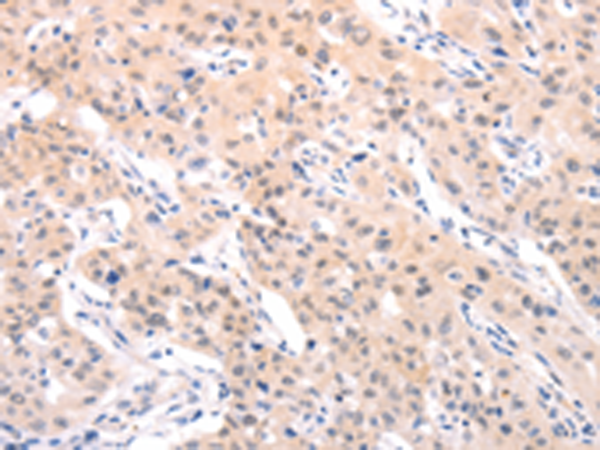

| WB | 咨询技术 | Human,Mouse,Rat |
| IF | 咨询技术 | Human,Mouse,Rat |
| IHC | 1/25-1/100 | Human,Mouse,Rat |
| ICC | 技术咨询 | Human,Mouse,Rat |
| FCM | 咨询技术 | Human,Mouse,Rat |
| Elisa | 1/1000-1/2000 | Human,Mouse,Rat |
| Aliases | TRAP; TRAP3; MGC:45012 |
| WB Predicted band size | 56 kDa |
| Host/Isotype | Rabbit IgG |
| Antibody Type | Primary antibody |
| Storage | Store at 4°C short term. Aliquot and store at -20°C long term. Avoid freeze/thaw cycles. |
| Species Reactivity | Human, Mouse |
| Immunogen | Fusion protein of human TRAF2 |
| Formulation | Purified antibody in PBS with 0.05% sodium azide and 50% glycerol. |
+ +
以下是关于TRAF2抗体的3-4篇参考文献的简要概括:
1. **"TRAF2 Is a Mediator of NF-κB Activation by TNF-R2 and CD40"**
- **作者**: Hsu, H., et al. (1996)
- **摘要**: 该研究通过免疫共沉淀实验验证TRAF2在CD40和TNF受体信号通路中的作用,使用TRAF2抗体证明其与CD40的直接结合,并参与NF-κB的激活。
2. **"Requirement for TRAF2 in Signaling via the TNF-R2 and JNK Pathways"**
- **作者**: Yeh, W.C., et al. (1997)
- **摘要**: 文章利用TRAF2抗体在基因敲除模型中研究其功能,发现TRAF2缺失导致JNK信号通路受阻,但NF-κB激活不受影响,揭示了TRAF2在细胞应激反应中的特异性作用。
3. **"TRAF2 Must Bind to cIAPs to Support TNF-Induced NF-κB Activation"**
- **作者**: Vince, J.E., et al. (2009)
- **摘要**: 研究通过免疫印迹(Western blot)和免疫沉淀技术,证明TRAF2与cIAPs蛋白复合物的相互作用对TNF介导的NF-κB激活至关重要,依赖TRAF2抗体验证其表达及复合物形成。
4. **"Ubiquitination and Degradation of TRAF2 by the Proteasome in Apoptosis"**
- **作者**: Habelhah, H., et al. (2004)
- **摘要**: 该文献使用TRAF2抗体检测其在凋亡过程中的泛素化及降解机制,发现TRAF2通过蛋白酶体途径被降解,从而调控细胞死亡信号传导。
这些文献均涉及TRAF2抗体的实验应用(如Western blot、免疫沉淀),并聚焦于其在NF-κB、JNK信号通路及凋亡中的功能机制。
TRAF2 (TNF receptor-associated factor 2) is a critical adaptor protein involved in signal transduction pathways mediated by the TNF receptor superfamily and interleukin-1 receptor/Toll-like receptor (IL-1R/TLR) family. It plays a central role in regulating immune responses, inflammation, cell survival, and apoptosis. Structurally, TRAF2 contains a RING finger domain for E3 ubiquitin ligase activity and a TRAF domain for interactions with receptors or downstream signaling molecules. It facilitates activation of NF-κB and MAPK pathways by recruiting signaling complexes, such as cIAP1/2. to promote ubiquitination-dependent signaling events. TRAF2 also suppresses caspase-8-mediated apoptosis by forming a complex with c-FLIP and caspase-8.
Antibodies targeting TRAF2 are widely used in research to study its expression, localization, and protein-protein interactions. They are essential tools in techniques like Western blotting, immunoprecipitation, and immunofluorescence to investigate TRAF2’s role in diseases, including cancer, autoimmune disorders, and neurodegenerative conditions. Some studies focus on TRAF2’s dual roles in cell survival/death, influenced by post-translational modifications (e.g., ubiquitination) or cellular context. Commercial TRAF2 antibodies are typically validated for specificity against human or murine isoforms. Researchers must consider potential cross-reactivity with other TRAF family members (e.g., TRAF1. TRAF3) and verify results using knockout controls or siRNA-based approaches.
×